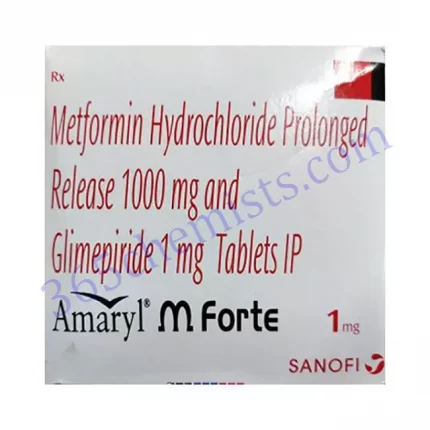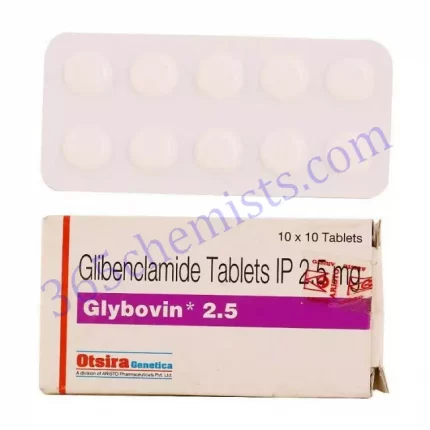Introduction
Glimepiride 1 mg and Metformin 500 mg are both present in the combo medicine Amaryl MV 1mg Tablet. It is a medication that is prescribed to treat type 2 diabetes mellitus, a disease marked by elevated blood sugar levels.
How Amaryl MV 1mg Tablet Works
Amaryl MV 1mg Tablet improves the body’s reaction to insulin by increasing pancreatic insulin production. The release of insulin is induced by glimepiride, which lowers blood sugar levels. Metformin reduces the liver’s ability to produce glucose while also making the body more responsive to insulin.
Usage and Dosage
- prescription: Follow your doctor’s instructions for taking Amaryl MV1mg Tablet strictly. Without first seeing your doctor, do not change the medication’s dosage or stop taking it.
- Administration: Drink some water and swallow the tablet whole. Although it can be taken with or without food, it is typically advised to do so in order to lower the risk of experiencing any gastrointestinal side effects.
- Dosage Modification: Your healthcare practitioner will adjust the dosage of Amaryl MV 1mg Tablet according on your blood sugar levels, treatment response, and other medical circumstances. Carefully adhere to your doctor’s directions.
Precautions and Warnings
It is crucial to let your healthcare practitioner know about any existing medical conditions, allergies, or drugs you are taking prior to taking Amaryl MV 1mg Tablet. The following are some dangers and warnings related to Amaryl MV 1mg Tablet:
- Amaryl MV 1mg Tablet may result in hypoglycemia, or low blood sugar. Recognise the symptoms of hypoglycemia, which include sweating, trembling, disorientation, and confusion. Consume a source of glucose, such as fruit juice or glucose pills, if you feel these symptoms, and seek medical help if necessary.
- Renal Impairment: If you have kidney issues or are on dialysis, use caution when taking Amaryl MV1mg Tablet. To ensure safe and effective drug use, your doctor may need to change your dosage.
- Other Medical Conditions: Be sure to let your doctor know if you have any additional health issues, such as liver illness, heart issues, or a history of pharmaceutical allergies. Your doctor will use this information to develop an effective treatment strategy and carefully monitor your health.
- Amaryl MV 1mg Tablet may raise the risk of hypoglycemia, especially in elderly patients or those who have liver or kidney disease. To prevent and treat hypoglycemia, blood sugar levels must be regularly monitored.
- Kidney and Liver Function: People with compromised kidney or liver function should use Amaryl MV 1mg Tablet with caution. Your doctor might change the dosage accordingly.
- Heart Disease: Your doctor will weigh the advantages and disadvantages of using Amaryl MV 1mg Tablet if you have a history of heart disease or are at risk for cardiovascular events. It’s crucial to regularly examine and control cardiovascular risk factors.
- Surgery and Medical Procedures: If you are having surgery or other medical procedures, let your doctor know that you are taking Amaryl MV 1mg Tablet. During this time, the medicine may need to be temporarily stopped or changed.
- Amaryl MV 1mg Tablet is not suggested for use during pregnancy or when nursing a baby. If you are breastfeeding or considering a pregnancy, talk to your doctor about alternate treatment choices.
- Keep in mind to use Amaryl MV 1mg Tablet in accordance with your doctor’s directions and to report any odd symptoms or concerns right away.
Related Product
Amaryl 1mg Tablet
Amaryl 2mg Tablet
Amaryl 3mg Tablet
Amaryl M 1mg Tablet
Amaryl M 2mg Tablet
Amaryl M Forte 1mg Tablet
Amaryl M Forte 2mg Tablet
Amaryl MV 1mg Tablet
Amaryl MV 2mg Tablet
Possible Side Effects
Amaryl MV 1mg Tablet adverse effects frequently reported include headache, nausea, diarrhoea, and upset stomach. Typically, these adverse effects are minor and transient. Consult your doctor if they continue or start to bother you.
Like many medicines, Amaryl MV 1mg Tablet may have unwanted effects. You should be aware of these side effects and contact your healthcare practitioner right away if you notice any unexpected symptoms. Amaryl MV 1mg Tablet potential adverse effects include:
- Amaryl MV 1mg Tablet’s ability to drop blood sugar levels can result in hypoglycemia, often known as low blood sugar. Sweating, trembling, lightheadedness, an accelerated heartbeat, confusion, and weakness are all possible hypoglycemia symptoms. It is crucial to address hypoglycemia as soon as you notice any of these symptoms by taking a source of glucose, such as fruit juice or glucose pills, and getting in touch with your doctor.
- Amaryl MV 1mg Tablet adverse effects that might affect the digestive system include nausea, vomiting, diarrhoea, and abdominal pain. Typically, these symptoms are transient and minor. It is advised to speak with your doctor if these adverse effects intensify or persist.
- Weight increase: Even though it’s not a typical Amaryl MV 1mg Tablet adverse effect, some people may notice a very modest weight increase. It’s crucial to routinely check your weight and talk to your doctor about any problems.
- Allergic responses: Allergic responses to Amaryl MV1mg Tablet may occasionally happen. An allergic response may cause a rash, itching, swelling, extreme dizziness, and breathing difficulties. If you encounter any symptoms of an allergic reaction, seek emergency medical attention.
- Other Side Effects: Amaryl MV 1mg Tablet can also result in less frequent side effects include headache, lightheadedness, blurred vision, and altered liver function. Inform your healthcare practitioner if you develop any side effects that are irritating or persistent.
- It’s crucial to remember that the list above is not all-inclusive and that other adverse effects could happen. It is best to speak with your doctor or chemist to get a full list of potential side effects and to talk about any worries you might have.
Serious negative Effects: Although uncommon, using Amaryl MV 1mg Tablet may cause serious negative effects. Severe allergic responses, liver issues, and lactic acidosis (a uncommon but deadly illness) may be among them. If you have symptoms like a rash, itching, yellowing of the skin or eyes, abdominal pain, or trouble breathing, get immediate medical assistance.
Drug Interactions
Medications you are currently taking, including prescription, over-the-counter, and herbal remedies, should be disclosed to your doctor. Amaryl MV 1mg Tablet may interact with other drugs, such as some antibiotics or antifungals, and lose some of its effectiveness or cause more side effects.
Avoid drinking excessive amounts of alcohol while taking Amaryl MV1mg Tablet as it may increase your risk of hypoglycemia and interfere with your ability to control your blood sugar levels.
Frequently Asked Questions (FAQs)
A1: Can diabetes be treated with just one dose of Amaryl MV 1mg Tablet?
A1: Glimepiride and metformin are both ingredients in the combination drug Amaryl MV 1mg Tablet. It is especially designed to be used in conjunction with a healthy diet and exercise to control type 2 diabetes.
How soon do the effects of Amaryl MV 1mg Tablet manifest themselves?
A2: Everybody reacts differently when anything happens. It is advised that you adhere to your doctor’s instructions and routinely check your blood sugar levels to determine the medication’s efficacy. If necessary, your doctor may change the dosage.
If my blood sugar levels are in control, may I stop taking Amaryl MV 1mg Tablet?
A3: Prior to changing your prescription regimen, it’s crucial to speak with your doctor. Without a doctor’s advice, stopping or changing the dosage can result in uncontrolled blood sugar levels. Based on your unique needs, your doctor will choose the best course of action.
Do Amaryl MV 1mg Tablets come with any dietary restrictions?
A4: Although there are no particular food limitations, it is still advisable to follow a balanced diet that has been approved by your doctor. Maintain a balanced eating routine that includes frequent meals and portion control to help you properly control your blood sugar levels.
Can Amaryl MV 1mg Tablet make you gain weight?
A5: Amaryl MV 1mg Tablet does not frequently cause weight gain as a side effect. Individual reactions, however, could differ. Discuss your worries about weight control with your healthcare professional so they can offer you personalised advice.
I’m pregnant. Can I use Amaryl MV 1mg Tablet?
A6: If you are breastfeeding, pregnant, or intend to become pregnant, you should speak with your doctor. Your healthcare professional will evaluate the potential risks and advantages and choose the best course of action for your particular circumstance.
Conclusion
A combination drug for the treatment of type 2 diabetes mellitus is called Amaryl 1mg Tablet. It has Glimepiride and Metformin, which jointly reduce blood sugar and increase insulin sensitivity. Pay attention to your healthcare provider’s recommendations for dose, administration, and safety measures. Be mindful of any adverse effects and seek medical help if required. To avoid any drug interactions, tell your doctor about any additional prescriptions you may be taking or any existing medical conditions. You can successfully control your diabetes and enhance your general well-being by adhering to the treatment plan and scheduling routine medical checkups.












